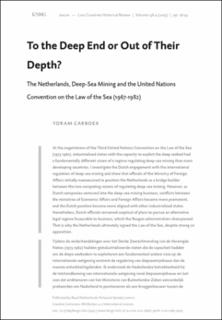To the Deep End or Out of Their Depth? The Netherlands, Deep-Sea Mining and the United Nations Convention on the Law of the Sea (1967-1982)
Peer reviewed, Journal article
Published version
Permanent lenke
https://hdl.handle.net/11250/3109238Utgivelsesdato
2023Metadata
Vis full innførselSamlinger
Originalversjon
10.51769/bmgn-lchr.17447Sammendrag
At the negotiations of the Third United Nations Convention on the Law of the Sea (1973-1982), industrialised states with the capacity to exploit the deep seabed had a fundamentally different vision of a regime regulating deep-sea mining than most developing countries. I investigate the Dutch engagement with the international regulation of deep-sea mining and show that officials of the Ministry of Foreign Affairs initially manoeuvred to position the Netherlands as a bridge builder between the two competing visions of regulating deep-sea mining. However, as Dutch companies ventured into the deep-sea mining business, conflicts between the ministries of Economic Affairs and Foreign Affairs became more prominent, and the Dutch position became more aligned with other industrialised states. Nonetheless, Dutch officials remained sceptical of plans to pursue an alternative legal regime favourable to business, which the Reagan administration championed. That is why the Netherlands ultimately signed the Law of the Sea, despite strong US opposition.

